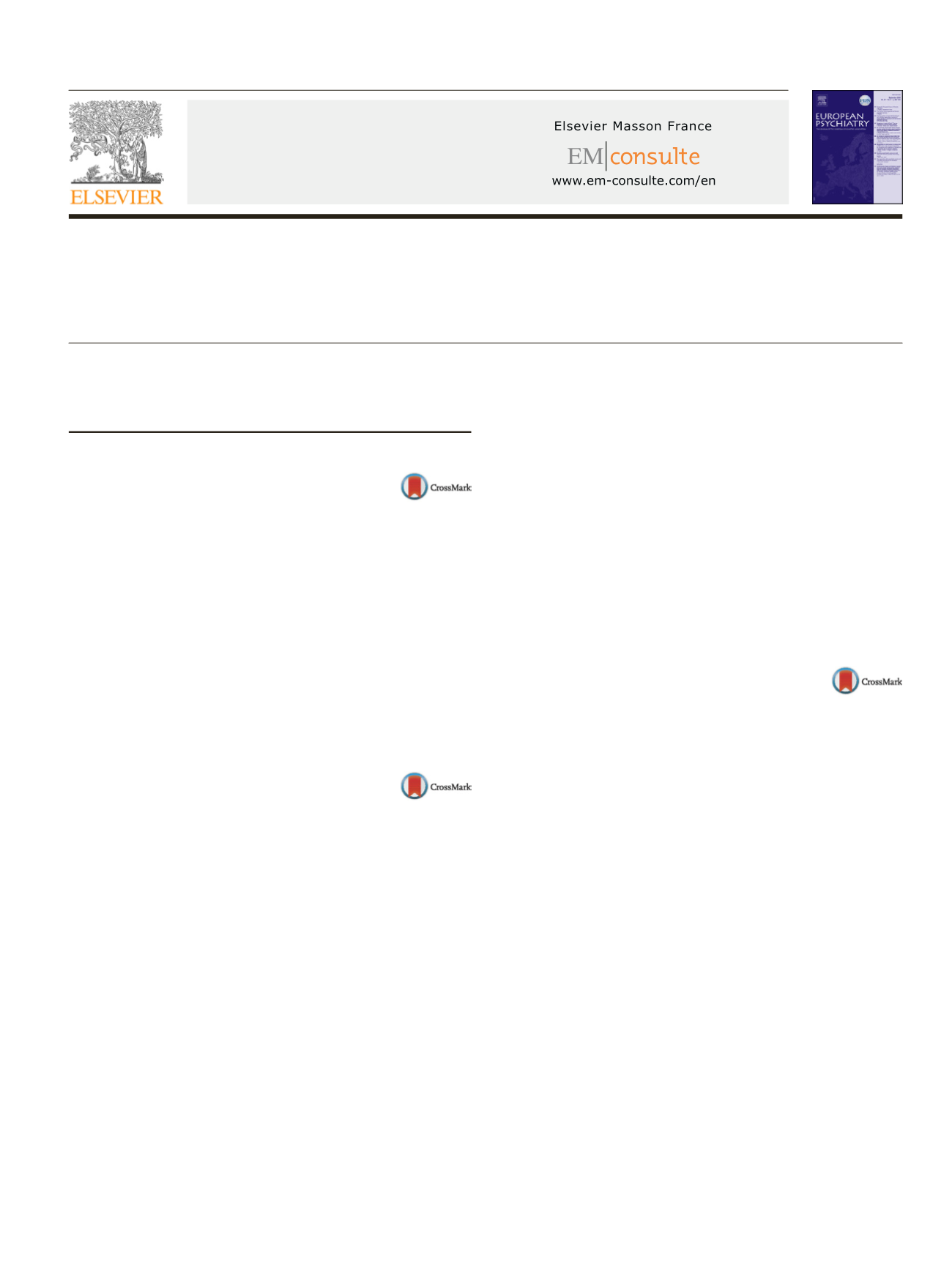
 European Psychiatry 41S (2017) S53–S68
European Psychiatry 41S (2017) S53–S68
Available online at
ScienceDirect
www.sciencedirect.com25th European Congress of Psychiatry
Workshop
Workshop: To screen or not to screen?
W001
Problems of screening for psychiatric
comorbidity in the medically Ill: What
can be recommended?
A. Diefenbacher
Evangelisches Krankenhaus Königin Elisab, Berlin, Germany
CL-psychiatrists have to work under severe time pressure in acute
care setting. Hence, it is necessary to have an armamentarium of
screening tools for disorders most frequently met in the general
hospital. This presentation will discuss such tools for delirium,
alcohol abuse, depression, personality disorders (“how to manage
difficult patients”), attachment styles. On a conceptual level, the
so-called “situational approach” in cl-psychiatry will be discussed.
Disclosure of interest
The author has not supplied his declaration
of competing interest.
http://dx.doi.org/10.1016/j.eurpsy.2017.01.024W002
The impact of screening psychiatric
comorbidity and high-risk feedback
on liaison psychiatric consultation
rates and clinicians’ attitudes on a
neurology ward
R. Van Damme
1 ,∗
, G. Portzky
1, P. Boon
2, G.M.D. Lemmens
11
Department of Psychiatry, Ghent University Hospital, Ghent Belgium
2
Department of Neurology, Ghent University Hospital, Ghent,
Belgium
∗
Corresponding author.
Introduction
Lifetime prevalence of psychiatric comorbidity in
neurological patients is as high as 55%, but it remains often
undetected and therefore untreated in hospital settings. Further,
clinicians tend to make little use of the consultative and liaison
psychiatric team for detection and treatment of anxiety and mood
disorders in neurological patients. The current study aimed to
investigate whether the implementation of a stepped screening
protocol with high risk feedback to the clinician had an influence
on the use of consultative and liaison psychiatric services.
Method
All patients admitted to the neurological ward were
assessed using a stepped screening protocol for depression, anxiety
and substance use during 15 months. Positive screening resulted
in feedback to the clinicians depending on the study phase (e.g.
feedback vs. no feedback).
Results
No differences were found in the use of consultative and
liaison psychiatric services during the non-feedback and feedback
phase.
Conclusion
Screening and high risk feedback of psychiatric
comorbidity in neurological patients does not increase psychiatric
referral rates. It points to the necessity of a more integrated col-
laborative care model for detection and treatment of psychiatric
comorbidity.
Disclosure of interest
The authors have not supplied their decla-
ration of competing interest.
http://dx.doi.org/10.1016/j.eurpsy.2017.01.025W003
The screening for depression and
neurocognitive disorders in subjects
newly diagnosed with HIV
S. Ferrari
1 ,∗
, C. Piemonte
1, L. Feltri
1, F. Ottolini
1, S. Maffei
2,
M.G. Nanni
3, S. Alboni
41
University of Modena & Reggio Emilia, Department of
Diagnostic-Clinical Medicine and Public Health, Modena, Italy
2
University of Parma, Department of Neurosciences, Parma, Italy
3
University of Ferrara, Department of Mental Health, Ferrara, Italy
4
University of Modena & Reggio Emilia, Department of Life Sciences,
Modena, Italy
∗
Corresponding author.
Background
Inflammatory mediators may be relevant to explain
the frequent comorbidity between depression, neurocognitive dis-
orders and HIV. HIV induces activation of inflammatory mediators,
mainly cytokines, that have been involved in the onset of depres-
sion and response to antidepressant treatment.
Aim
To identify recurring profiles of inflammatory biomarkers
subtending depression, effectiveness of antidepressants and neu-
rocognitive disorders among HIV-infected individuals.
Methods
All adult newly HIV-diagnosed out-patients attending
HIV clinics in three towns of Northern Italywere screened, assessed
for depression and studied immunologically and for neurocognitive
disorders.
Results
Twenty-five patients have been enrolled so far: of these,
35% were positive to PHQ-9 screening, of which 6 were positive to
the diagnostic assessment for depression. No neurocognitive disor-
ders were found among the patients. As the project will develop, it
http://dx.doi.org/0924-9338/


















